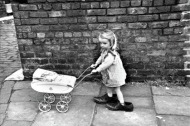|
With the media furore over school sexuality education over the past week, many parents have been asking what their expectations of their child’s school sexuality education should be... So here it is, Part One of the non-official Concise Guide to School Sexuality Education in NZ...
The sexuality education prescribed in the current curriculum is a far cry from the sex ed most parents would have received when they were at school. For many, this “education” now serves as a hilarious dinner party story, for others sex ed barely existed or was so terrible that all memories have been banished. Indeed, my own high school sex ed was taught by a very embarrassed science teacher who managed to get through the entire 'reproduction' unit without once mentioning the word ‘penis’ – he simply referred to that thing as a "John Thomas”. And we were told we must always make sure we put the Johnny Condom on the John Thomas. The standout memory from the ‘period talk’ at primary school was the horror of the “pad burner” - a raging inferno in the girls toilets with which we were instructed to put our used pads. I am not sure I ever raised the confidence to use that thing! (I am told they no longer have these at schools - phew!) Today I want to address three main questions that I have been asked over the past week: 1. How much influence do I, as a parent, have on the sexuality education programme at my child’s school? The most important thing for parents to keep in mind is that school sexuality education programmes are a partnership between the school and the community. As such, schools are obliged to consult with their community every two years on the content of their health education programme. According to Section 60B of the Education Act 1989, every school Board of Trustees is required to inform the school community about the content of the sexuality education programme and consult with members of the school community regarding the way in which the school should implement this education. Following this consultation, a school sexuality education policy and programme are constructed. In reality, the definition of ‘consultation’ can be interpreted quite broadly. Some schools send out information in school newsletters, others organise information evenings. Some schools don’t do much consulting at all. This doesn’t mean they are ‘bad’ schools, it’s just that the reality for schools is that they are operating in a jam-packed curriculum in an environment focussed on literacy and numeracy. Sometimes sexuality lingers at the bottom of that ‘to do’ list. Some schools put a lot of effort in to the consultation, and many receive absolutely no feedback from their community. 2. What if I don’t want my child to participate in sexuality education? There are many reasons why parents may consider withdrawing their child from the school sexuality education programme. Indeed, following the media frenzy last week over sex ed, I guess more parents will be considering this. It’s been widely mis-reported in the media this week that parents need to sign a consent form for their children to participate in a school sexuality education programme. They don’t. Some schools choose to do this, but it is not required. Legally, every school is obliged to inform parents what the programme consists of and no contact from a parent conveys to the school that they are happy to have their child participate in sexuality education. There is provision under section 25AA of the Education Act 1989, for parents to write to the principal to request that their child be excluded from sexuality education. Note that this exclusion does not apply to other times during the school day when a teacher deals with a question raised by another student that relates to sexuality education. 3. But I don’t want my child learning about contraception! If you feel this way, it’s important you discuss this with your Board of Trustees and Principal. If you do feel strongly about this issue you may decide to withdraw your child. However you need to know that the 1990 repeal of section 3 of the Contraception, Sterilisation and Abortion Act 1977 removed all restrictions on the advice and supply of contraceptives to those under 16 years of age. Young people of any age now have the right to access information about contraception and to be supplied with contraceptive products without parental consent. In reality, this means that if your child wants information about contraceptives, the school is able to provide this, regardless of parental consent. Part two coming up later this week. It will answer the question: "What SHOULD my child be receiving as part of a quality sexuality education programme?" **Disclaimer – there are some schools and some teachers doing an absolutely fantastic job delivering sexuality education in New Zealand. I applaud these people. Those that are struggling with it are struggling because of a multitude of reasons, not easily addressed in a 200 word attention-grabbing newspaper article. If you are a parent and are concerned about the sexuality education in your school, I urge you to contact the Principal and your Board of Trustees to discuss your concerns.
1 Comment
Discussing relationships is an important part of the sexuality education I teach. Young people are always eager to discuss the different social norms and expectations. It is also a topic that most parents approach with trepidtation. I have just watched this instructional video from 1951 about "what to do on a date"...  I viewed this video with a smile on my face, sighs of "how sweet" and thoughts of how lovely and simple things were back then.... Back to reality: there were just as many nerves and broken hearts as there are now. Teen pregnancy was common, it was just hidden in barbaric ways. Or young people were forced into marriages they didn’t want. Sexually transmitted infections were present, they were just hugely stigmatised and rarely treated. The risks of heartbreak, pregnancy and disease that were present in 1951 are still there now, but nearly fifty years on, these risks are magnified and that 'benchmark' age when children are exposed to these risks is becoming ever-lower. The concept of childhood is becoming increasingly short. - in 1951 the marketing concept of 'tween' had not been invented. The behavioural expectations of late-teens in 1951 are the behavioural expectations being thrust upon our pre-teens now. The tween phenomena has children wearing makeup, high-heels and parents taking them along to waxing salons. They hear it on TV, YouTube and social networking sites. This sexualisation of our children naturally leads to an early curiosity about sex and relationships. In order to be prepared for these pressures it is crucial that our young people are able to make safe decisions that will keep them happy and ensure their well-being. They need their parents support in this. More than ever, parents need to have the knowledge and confidence to be able to discuss sexuality and relationships with their children. Many parents say to me “oh but my child has no interest/no idea/no awareness about anything to do with sexuality.” This may be true, but their classmates are, and their classmates are talking. I posit it to the parents: if your child is not talking to you, they are talking to someone else and getting their information from them. What would you prefer? It’s never too early to start this ongoing conversation: make sure you don’t leave it a moment longer. |
AuthorRachel is a writer and educator whose fields of interest include sexuality education, gender, feminism and youth development. Archives
November 2023
Categories
All
|

 RSS Feed
RSS Feed




